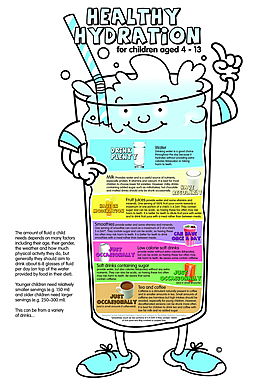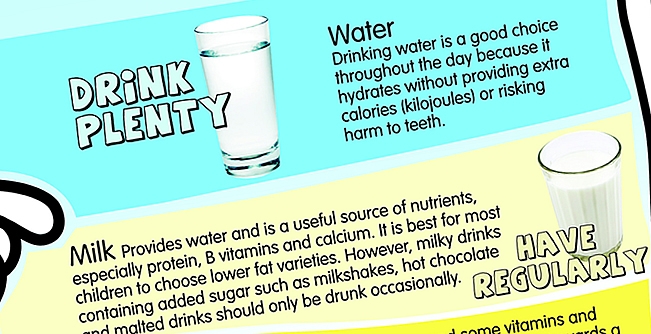A new child-friendly, educational tool providing important hydration advice has been launched today, coinciding with research showing that schoolchildren may improve their cognitive performance by hydrating with water.
 The ‘Children’s Hydration Glass’ developed by the Natural Hydration Council (NHC) in collaboration with the British Nutrition Foundation (BNF), aims to inform both parents and children on healthy hydration guidelines. The infographic (pictured) includes hydration guidance and advice on fluid consumption for children, whilst taking into account the impact that some drinks may have on dental health.
The ‘Children’s Hydration Glass’ developed by the Natural Hydration Council (NHC) in collaboration with the British Nutrition Foundation (BNF), aims to inform both parents and children on healthy hydration guidelines. The infographic (pictured) includes hydration guidance and advice on fluid consumption for children, whilst taking into account the impact that some drinks may have on dental health.
Research published in the latest issue of Complete Nutrition found that providing children with water at school significantly increased levels of cognition, including factors such as visual memory and performance[i]. Led by Dr Emma Derbyshire from Manchester Metropolitan University in association with the Natural Hydration Council (NHC), the project involved 166 children aged 11 to 12 years drinking bottled water to increase their fluid intake to the level recommended by the European Food Safety Authority[ii] for 14 days.
Dr Derbyshire, who investigated the hydration levels of children at St James’s Church of England School & Sports College (Bolton), commented: “This research indicates that adequately hydrated children may perform better and be better behaved in school. It also backs up the new Children’s Hydration Glass, which clearly specifies where priorities should lie in terms of hydration choices and also presents this information in an engaging way for children.”
Bridget Benelam, Senior Nutrition Scientist at the BNF said “We know there is a lot of confusion about how much and what children should be drinking. Water is a great choice to keep children hydrated, but other drinks like milk, juices and soft drinks can contribute too. It’s just important to be aware of the calorie content of drinks and the potential impact on dental health so that parents and carers can help children to develop healthy drinking habits.”
Evidence from the University of East London found that older students who brought water into their exams performed academically better than those who went without[iii]. The researchers, who studied the behaviour of 447 undergraduate students, believed that water consumption had a physiological effect on thinking functions as well as alleviating anxiety that resulted in improved exam performance.
The amount of fluid a child needs depends on many factors including age, gender, weather and how much physical activity they undertake but generally they should aim to drink about 6-8 glasses of fluid per day (on top of the water provided by food in the diet). Younger children need relatively small servings (e.g. 150ml per drink) and older children need larger servings (e.g. 250–300ml per drink).
Dr Derbyshire, continues: “There is now an extensive range and quantity of evidence backing up the benefits of hydrating with water for aiding cognitive performance. Furthermore, simple measures like the addition of a bottle of water to the school lunchbox or backpack by parents could help to reinforce healthy hydration habits in children.”
In general, children are at greater risk of dehydration than adults due to their lower body weight and smaller reserve of body fluids. Importantly, whilst adults often have easy access to a supply of water, children tend to rely on their guardians and teachers to provide drinks and often don’t recognise the early stages of thirst.
More information and a downloadable version of the ‘Children’s Hydration Glass’ is available from www.naturalhydrationcouncil.org.uk.








